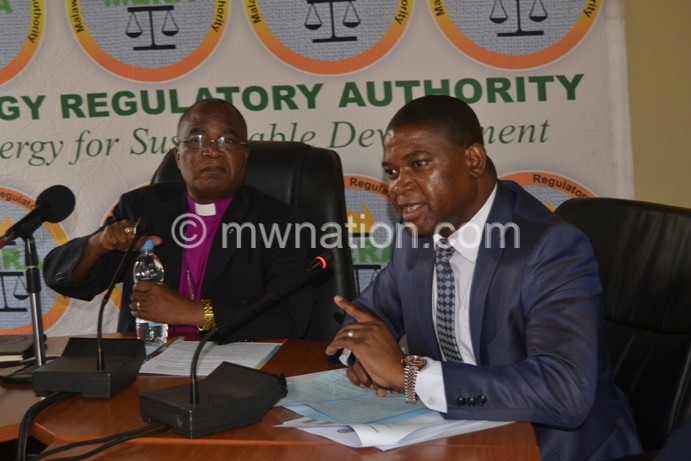Escom wants to re-engage Mera on tariffs
Barely one week after the Malawi Energy Regulatory Authority (Mera) trimmed to 31.8 percent Escom’s 60 percent tariff hike proposal, the power utility plans to renegotiate the matter with the regulator.
Electricity Supply Corporation of Malawi (Escom) chief executive officer Allexon Chiwaya told a news conference in Blantyre on Tuesday the power utility believes that the approved tariff hike—spread over a four-year period effective October 1 this year—would not enable it to address the challenges it is facing.

He said: “While we appreciate the 31.8 percent that Mera approved, we still feel there is need for re-engaging the regulator on this matter.
“The Millennium Challenge Account Malawi [MCA-M] has given us a wide pool of assets that we need to fully utilise. In order to do that, we must have access to resources that can help us achieve our goals.”
Reacting to Escom’s position in a written response on Tuesday, Mera consumer affairs and public relations manager Fitina Khonje said Escom, like any other Mera licencee, was free to engage the regulator on any matter that is critical to the sector.
She said: “All our licencees are free to contact us should they need more clarification on our decisions. We first have to assess the merit of their proposal and we can take it from there.”
Mera rejected Escom’s 60 percent power tariff increase application last week following nationwide public consultations.
Escom had sought to increase tariffs from an average K73 per kilowatt hour (kWh) to K117 per kWh over a period of four years.
But Mera said it has approved an average increase from the current K73.23 to K88.02 for 2018/19. Effectively, this meant that from October 1 2018, consumers are now paying an average 20 percent more per kilowatt hour.
Making the announcement in Lilongwe, Mera board chairperson Bishop Joseph Bvumbwe said the 31.8 percent increase would translate to an average tariff of K95.15/kWh against K117.64/kWh which Escom requested.
Mera also said it made the decision to protect the consumer by approving the annual increase based on the extra kilowatt per hour that Escom offers its customers.
Mera chief executive officer Collins Magalasi said the regulator had approved the revenue increase to Escom on the promise that it would provide the power that consumers are annually paying extra for.
In its application, Escom had planned that power procurement costs would reach K718.9 billion, but Mera asked the company to reduce the import costs for power from Mozambique and power purchase agreements costs with the Ndiza-Ruo hydroplant because there would be increased revenues.
The adjustment resulted in the reduction of power procurement costs by about K12 billion.
On Tuesday, Escom senior commercial and customer services manager Wiseman Kabwazi said the power utility was striving to achieve efficiency courtesy of the tariff increases that Mera approves.
During on Tuesday’s news conference, Escom officials also announced a new tariff plan that would see its customers from different categories buy the first 50 electricity units at a base rate of K47.50 per unit. Chiwaya said the company had plans to upgrade its operations to reflect the hike.
The plan—dubbed lifeline tariff—stipulates that any additional unit after the 50 mark will see the domestic consumer buy at K63.76, representing a 30 percent increase.
Last week, Malawi Confederation of Chambers of Commerce and Industry (MCCCI) chief executive officer Chancellor Kaferapanjira, while welcoming the news of the hike, called upon Escom to address the power challenges the country has been facing so as to justify the increase.
Mera also slashed the depreciation for donor funded projects because these are already paid for and consumers should not have to pay for them again.





